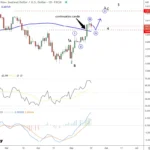

Gustave Courbet The wave 1869
A while ago, I asked a regular commenter at the Automatic Earth, who goes by the moniker Dr. D, to try and write an article for us. Not long after, I received no less than 31 pages, and an even 12345 words. Way too long for today’s digital attention spans. We decided to split it into 5 chapters. After we work through those 5, we’ll post it as one piece as well. Dr. D, who insists on sticking with his nom de plume, picked his own topic, and it’s -fittingly- bitcoin. A topic about which one can cover a lot of ground in 12345 words.
Now, I wouldn’t be me if I didn’t throw in my own two Satoshis: Dr. D claims that “..everyone has an equal opportunity to solve the next calculation..”, but while that may perhaps have been sort of true at the very start, it isn’t now. It’s not true for the computerless or computer-illiterate, for those too poor to afford the electricity required by bitcoin mining, and for various other -very large- groups of people.
The equal opportunity idea sounds nice, but I think bitcoin runs the risk of creating just another set of elites while reinforcing existing elites, who can afford to either buy bitcoin at whatever price at some point in time or spend large sums to build mining ‘installations’ in locations where electricity is cheap. And sure, there will be losers among elites too, but inequality itself will not change; only the faces of winners and losers will, while the world’s real losers will remain just that.
It’s nothing new of course, inequality is our society’s middle name, but maybe that is precisely the problem. Maybe bitcoin should have come with an inbuilt way to spread wealth, not just shift it around.
Then again, it may all just be a giant bubble. Or a bubble inside a bubble inside a bubble.
Here’s your Dr.
Dr. D: Bitcoin is all the rage today, and as it crosses over $10,000, a 10-bagger for the year, we should look at what it is, what it isn’t, and why it’s become so popular. Note my observations are those of a layman – which may be more useful than those of a programmer – but also those of a skeptic, which I’ll get to at the end.
First, what is Bitcoin? Well, the idea of digital money goes back to the first digits, financial mainframes. In fact, the “money” in use today throughout the financial system have long been no more than virtual 1’s and 0’s on a spinning hard drive somewhere, but the idea of Bitcoin-money, private-money, goes back further still. I mean, what is “money”? At its core, it’s no more than the most-tradable good in a given society, a trading chit we use as a measurement tool, a token recording how much value we created or are owed. Arguably the first money was not gold, not seashells or even barter, but a promise. Let me borrow your net and I’ll give you a couple fish from the work. Why? Because you might break the net or I might use it, so I need to get paid for my risk, reward for my effort in making and storing the net to begin with.
So money at its most austere is simply a promise. But a promise to whom for what? And that’s the problem. No matter what good you use, people place differing values on it, different time-preferences, and most especially ways to cheat, game the system, and renege. This is bad among businesses, banks – who are after all only men – especially bad among governments, but worst of all among government and banks combined. Because, should the banks lie, renege, default, abuse their privilege, who then would hold them to task?
In the past, over and over, groups have created their own “money”. The whole 19th century was marked by general stores extending credit, bank notes issued by thousands of private banks, each with their own strength and solvency and geography and discounted accordingly. In the 20th century, with central banks controlling money, many cities issued local “scrip” – promises to pay – in Detroit in the Depression, or California in the budget crunch of 2009, or “Ithaca Dollars” in NY as a sort of ongoing Ivy League experiment. But the problem with these only highlights the problems with money generally: who can issue them? Everyone? A central authority? Can they deliver goods? And what can they buy, not just in value but in location?















